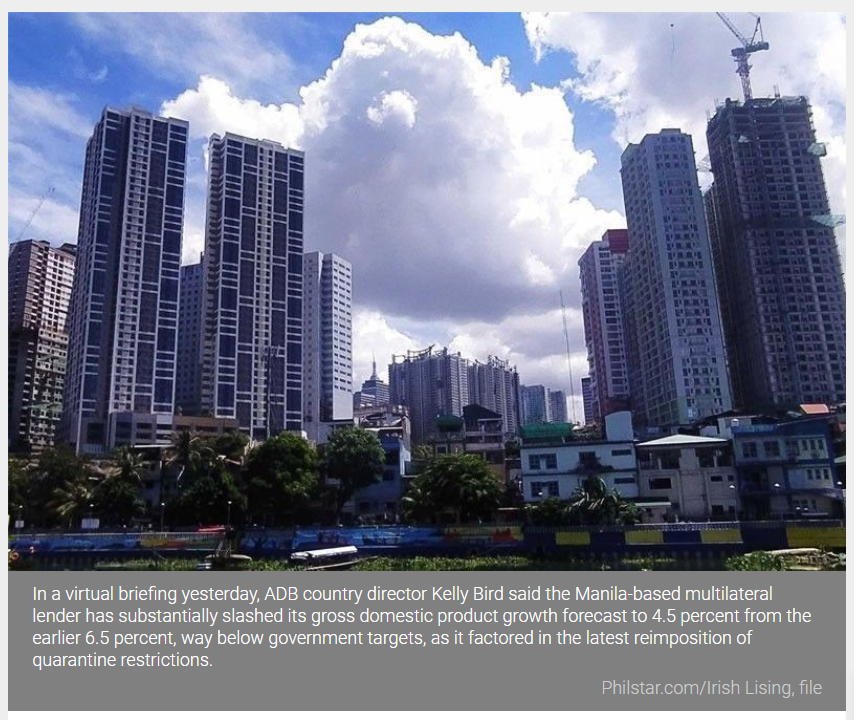ADB cuts Philippine growth forecast
As high unemployment seen to linger
MANILA, Philippines — The Asian Development Bank (ADB) has joined other international agencies and local think tanks that cut growth projections for the Philippine economy this year.
In a virtual briefing yesterday, ADB country director Kelly Bird said the Manila-based multilateral lender has substantially slashed its gross domestic product (GDP) growth forecast to 4.5 percent from the earlier 6.5 percent, way below government targets, as it factored in the latest reimposition of quarantine restrictions.
“The Philippine economy is on the road to recovery but it is not as fast as we expect it to be. There is a global shortage in vaccines that could delay the country’s rollout; there’s also delayed reopening of the economy. But all these are not unique to the Philippines,” Bird said.
Bird said the ADB is “90 percent confident” the economy will grow by 4.5 percent or higher. For the first time, ADB set a “floor” estimate for the Philippines.
“There’s a wide range of projection and that just reflects the heightened uncertainty in the environment and how the pandemic will unfold globally and domestically for the year,” Bird said.
“There are upsides to it, if the vaccination goes faster than expected, or consumer confidence recovers faster because of the vaccine,” he said.
Expected drivers for growth this year include accommodative fiscal and monetary policies, public and household spending, and increase in export commodities. Recovery also hinges on huge spending on infrastructure.
However, private investment will remain subdued due to excess industry capacity and as enterprises defer investments as they begin to repair their damaged balance sheets.
Still, Bird argued that the rollout of COVID-19 vaccines is the key to the safe opening of the economy and boosting consumer and business confidence.
“Vaccine deliveries have been delayed, there are production issues. These are out of the control of the government,” he said.
Bird said the pandemic is expected to have longer scarring effects on the country’s labor force as additional employment generation does not necessarily equate to quality jobs even as the economy recovers from the health crisis.
He said the pandemic’s shock to the economy is creating a persistent negative change in the employment rate even as the economy rebounds moving forward.
Bird is concerned that the pandemic may have long term effects on employment over the medium term especially as the lockdowns created a bigger drop in formal employment relative to informal employment.
The government’s economic team has been parading the increase in the number of jobs generated over the last few months as compared to last year, saying jobs have returned to pre-pandemic levels.
“But what we are seeing is that composition has changed, between formal and informal, and across sectors. Our concern is that the employment being generated is in the informal sector,” Bird said.
“These are generally less stable employment activities. Earning is not stable, not covered by the social system. Lower quality jobs have been created, not quality jobs. There may be some long term scarring effects,” he said.
Some 1.7 million wage jobs in the private and public sector have been lost due to the pandemic while nearly 450,000 workers have shifted to informal and precarious or uncertain jobs with compressed earnings.
Unemployment also remains elevated at 8.8 percent, well above the long term trend while average hours of work were reduced to 39.3 hours per week.
In the medium term, Bird is expecting to see an increase in skills mismatch where workers do not easily transition. He said the government should focus on wage and subsidies, training, unemployment insurance and policy reforms.
“Job losses can lead to hysteresis through skill erosion. Disruption to schooling, on the job training, and longer periods of unemployment for job seekers leads to lost skills, they become less employable and lowers potential supply of the economy,” Bird said.
Source: https://www.philstar.com/business/2021/04/29/2094451/adb-cuts-philippine-growth-forecast


 English
English




